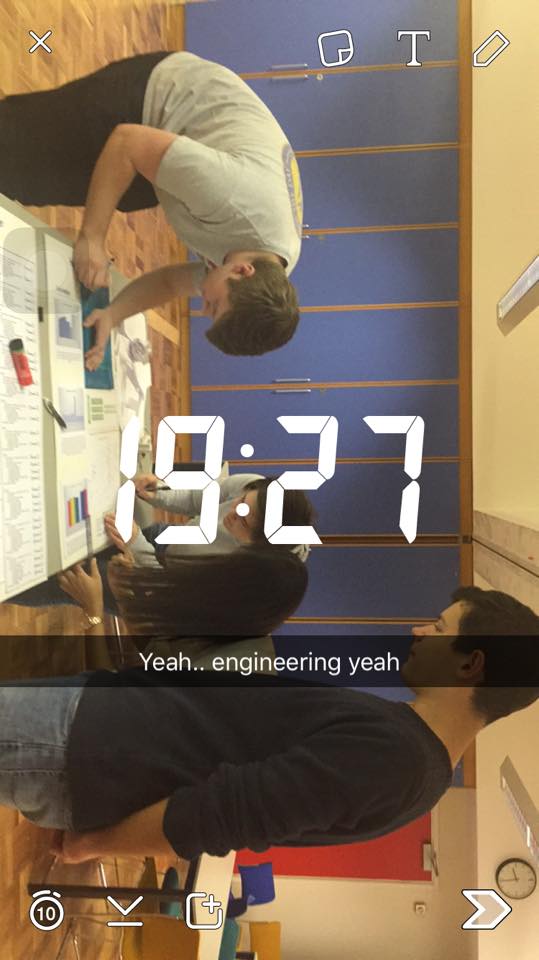We’ve literally just started university, and the first term has almost already passed… So it’s time to talk a little bit about the achievements (or “achievements”…) so far.
On the first week we had several introductory lectures, but one of them was particularly interesting. It was about assessments and grades. And the lecturer kept emphasising:
“Don’t expect 100% on all tests!”
He also said that it will be new for most of us, because we were most likely to be the best students in our class, and we were the ones who got 100% all the time. But that time is over, because everyone can’t be the best so we have to get used to the thought of failing. In addition, he said that “The competition part was to get into Imperial. Now that the competition is over, you have to help each other.” And that’s how we started the term…
Our first assessed coursework was the First Year Design Project – immediately on the third week! The idea is that we get a feeling for what “chemical engineering” means. Well, it was more like we tried to do something we knew next to nothing about, but we did it anyway 😀 It was a teamwork project, which means we had to work in our tutorial group. I am not that used to working with others, so it was a bit difficult for me to consider their ideas as well, but I somehow managed to get a quite decent peer assessment grade, so I wasn’t that bad after all…
We had 5 days to do the final design. The whole design was evaluated based on our powerpoint presentation and a poster. We spent the first two days chatting about ideas and thinking about calculations. On the third day we realised we should actually do something, because the deadline is coming. We did some calculations, and then we realised we need a lot more calculations. Then on the fourth day we stayed in till 19:30 to finish the poster and the presentation… 😀 Finally, on the fifth day we held our presentation. I thought it went quite well…
The next week we had a feedback session. They told us it was “good, but…” After that “but” I didn’t really listen, because that “but” meant not 100%. And I always expect 100%. I don’t care if it’s 99% or 30%. It’s below 100, therefore it’s a failure. It turned out we got around 70% (they didn’t tell us the actual grade). I was devastated… But then I remembered that first speech about “don’t expect 100% all the time”. I realised this is university now: success and failure, hand in hand. So, this Design Project taught me one thing (besides “what chemeng means”): what failure means, and how to handle it.
And the peer assessment? 😀 First of all, let me explain what PA is. When we work in a team, the lecturers or the teachers can’t be there all the time to watch everyone’s contribution and mark us based on that. Also, it’s not very fair if those who worked very hard and those who did nothing get the same grade. Therefore they introduced the system of peer assessment: we have to evaluate all of our teammates on a 1-5 scale and write a few sentences about their performance. Based on this score, we all get a normalised PA mark, which indicates our contribution to the team. And we also get the anonymous feedback so that we know what went well/wrong. I think it’s really helpful and I learned a lot from my feedback. And next year, our groupmark will be multiplied with the PA mark and that’s how we will get our final mark.
All in all, First Year Design Project is… fun, after you figure out what to do with the remaining power in the third stream 😀

The second “big thing” was the Matlab course. Matlab is a “very powerful calculator”, a programming language in which you can basically calculate everything you need. We had a 3-week Matlab course, 4 times a week, 3 hours a day. It was pretty intense…
For those who never had done coding before, it was a nightmare. I was extremely lucky, because I did some self-study in the summer, so I had a rough idea about the variables, the loops, the commands, the functions, and all these things. After the first few sessions, I realised doing coding in the summer was invaluable: I had hardly any problem understanding the new things, and I only had to focus on keeping up with the speed.
We had two assessments, one at the end of week 2, and a second (final) one at the end of week 3. They told us that we shouldn’t worry about them as they only count a negligible percentage towards our degree. But that’s not how an Imperial student’s mind works 😀 So I worried all day before the exams, and after that I was constantly checking Blackboard (our virtual learning environment) if they had put up the marks.
I was at my room in Woodward when I got the result. It was the night before the Christmas test, so I was trying to revise. And then, this email suddenly came from the course leader saying
“Just a quick message to congratulate you on your Matlab grade – you have done exceptionally well.”
I rushed to open Blackboard to see my actual mark… I was expecting something around 80%, but I got 94%!!! I was so happy, I couldn’t do any work after that. I called my family to tell them, then I went to the kitchen to tell all my flatmates, then I kept smiling for a ridiculously long time… This was my first real success in Imperial, and it felt so good… I love Matlab!!! 😀
Our last assessment was the Christmas Test. This was supposed to be the easiest from all three, because this is just a feedback, a progress test. It counts absolutely zero percent to our final grade. But still, everyone was super-nervous in the morning, everyone did more (or less) revision and everyone tried to “ace” the test (as our Process Analysis lecturer suggested…).
The test itself was a Mastery test. That means only the Mastery subjects were covered: Fluid Mechanics, Thermodynamics and Process Analysis. We were given a calculator, a data sheet and a steam table… and 3 hours to write down everything we learnt about the subjects so far. After I quickly read through all 3 papers, I decided to start with Fluid because that seemed to be the easiest. I used some equations from the equation sheet, converted some numbers, and got some roughly reasonable answers. I checked the time, I still had 2.5 hours left, so I started Process…
There is one thing I might haven’t mentioned yet, I love Process. It’s exactly what I was looking for in ChemEng: it includes a bit of chemistry, a bit of physics, a bit of maths, but most of the time it’s just sudoku and logic. You are given a description of a process, full of data. You have to extract all the relevant information to draw the diagram (after you read the process description at least 3 times… 😀 ), and then you have to make a stream table (a table listing all the streams and all the compounds involved in the process). It’s usually an approximately 10×10 table, so most people just skip this part (if you are focused and know what you do, you might be able to solve it without a stream table). But I do stream table all the time, because I like the stream table 😀 It’s surprisingly similar to a sudoku, and those who have ever done sudoku know what I mean when I say: filling out a stream table gives pure satisfaction…
So I started the Process question, read it line by line, draw the diagram, and started the calculations. I lettered them so that I didn’t get confused… When I was at line T, I realised I made a mistake. I didn’t know what it was, I didn’t know where it was, I only knew there was a mistake somewhere… The thing is, finding a mistake in a sudoku table is almost impossible. You might have better chances with a stream table, but it’s still unusual to find it without losing plenty of time. So I quickly switched to Thermo, but I couldn’t get Process out of my mind…
I found the first two Thermo questions quite easy, but then I spent too much time on the last one, and got no actual answer… So I went back to Process and I spent the last hour trying to find my mistake inside the jungle… I checked every calculation from the beginning, and after 20-25 minutes, I realised I have the mistake in line K. That meant the whole bit under K was completely wrong… I crossed out everything from K to T and hurriedly recalculated all of them. Eventually I filled out the stream table but it looked a complete mess.
When the time was up, I felt sad. Not because I did particularly badly on the test (it counts zero anyway), but because my stream table looked so messy… I was angry because I practised it a lot and I knew where the possible chances of making a mistake were. I was tired because even though 3 hours sound not too long (my high school final physics exam was 5-hour long), it required extraordinary focus from the beginning till the very end. And foremost I felt sad because I wanted my stream table to be shiningly perfect, and at the end it was just a complete mess with (hopefully) the right numbers…
And now, the waiting for the results begins…



